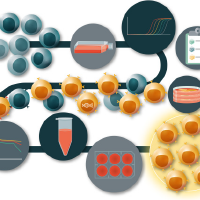Next steps in MSC cell therapy characterization
Cell & Gene Therapy Insights 2019; 5(1), 109–115.
10.18609/cgti.2019.014
 Bruce Bunnell PhD is the Director of the Tulane Center for Stem Cell Research and Regenerative Medicine and Professor in the Department of Pharmacology in the Tulane University School of Medicine. In addition, he holds the Aron Family Regents Distinguished Chair in Gene Therapy. Dr. Bunnell obtained his PhD in Microbiology from the University of Alabama at Birmingham School of Medicine. He then pursued Postdoctoral Fellowship research at the Howard Hughes Medical Institute in the School of Medicine at the University of Michigan and the National Human Genome Research Institute at the National Institutes of Health in Bethesda, MD. Dr. Bunnell was an Assistant Professor at the Nationwide Children’s Hospital Research Institute, part of the Ohio State University School of Medicine prior to joining the faculty at Tulane University in 2002. Dr. Bunnell’s research program is focused on both the basic science and translational applications of adult stem cells isolated from the bone marrow and adipose tissue. Dr. Bunnell investigates the use of mesenchymal stem cells isolated from the bone marrow or adipose tissue as a therapeutic intervention for both Multiple Sclerosis (MS) wound injury, lung injury and bone repair. He is currently working towards a human clinical trial for the treatment of MS with these cells. He has served as a reviewer of stem cell, regenerative medicine and tissue engineering grants for the National Institutes of Health, Department of Defense and several state funded programs including Maryland, New York, Virginia and Pennsylvania. He has also served on grant review panels for several foreign countries including Denmark, Ireland, Germany and Spain. Dr. Bunnell serves as an Editorial Board Member for several journals, including Stem Cells, BMC Genomics, and Regenerative Medicine. He has recently ended a term as a member of the NIH TAG study section.
Bruce Bunnell PhD is the Director of the Tulane Center for Stem Cell Research and Regenerative Medicine and Professor in the Department of Pharmacology in the Tulane University School of Medicine. In addition, he holds the Aron Family Regents Distinguished Chair in Gene Therapy. Dr. Bunnell obtained his PhD in Microbiology from the University of Alabama at Birmingham School of Medicine. He then pursued Postdoctoral Fellowship research at the Howard Hughes Medical Institute in the School of Medicine at the University of Michigan and the National Human Genome Research Institute at the National Institutes of Health in Bethesda, MD. Dr. Bunnell was an Assistant Professor at the Nationwide Children’s Hospital Research Institute, part of the Ohio State University School of Medicine prior to joining the faculty at Tulane University in 2002. Dr. Bunnell’s research program is focused on both the basic science and translational applications of adult stem cells isolated from the bone marrow and adipose tissue. Dr. Bunnell investigates the use of mesenchymal stem cells isolated from the bone marrow or adipose tissue as a therapeutic intervention for both Multiple Sclerosis (MS) wound injury, lung injury and bone repair. He is currently working towards a human clinical trial for the treatment of MS with these cells. He has served as a reviewer of stem cell, regenerative medicine and tissue engineering grants for the National Institutes of Health, Department of Defense and several state funded programs including Maryland, New York, Virginia and Pennsylvania. He has also served on grant review panels for several foreign countries including Denmark, Ireland, Germany and Spain. Dr. Bunnell serves as an Editorial Board Member for several journals, including Stem Cells, BMC Genomics, and Regenerative Medicine. He has recently ended a term as a member of the NIH TAG study section.
